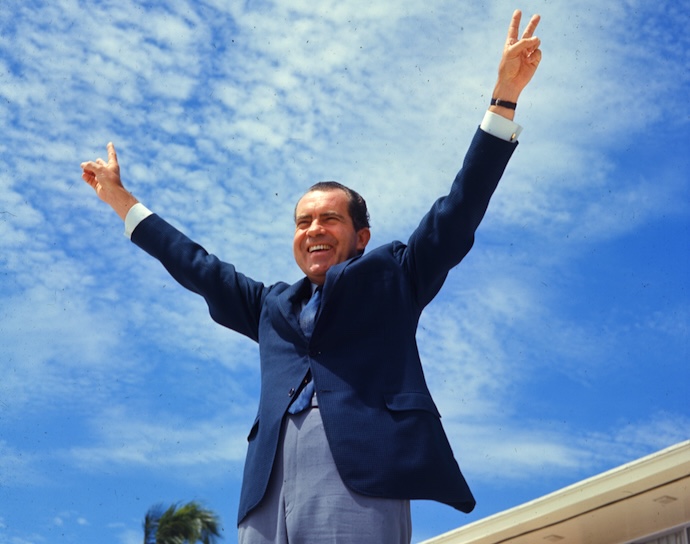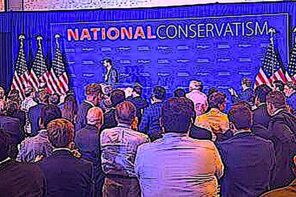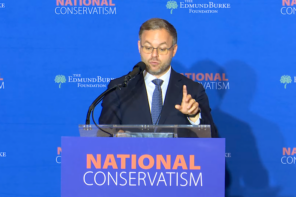During a 1977 series of interviews (for which he was paid handsomely), Richard Nixon, responding to journalist David Frost’s question about Watergate, uttered these fateful words: “When the president does it, that means that it is not illegal.” At the time, almost everyone in the legal profession, from lawyers to judges, firmly rejected the premise that the president was above the law. In fact, it was 50 years ago this month—July of 1974—that the Supreme Court ruled against Nixon (and the notion of limitless executive privilege), effectively bringing about the end of his presidency. The legal situation was so clear that, in his pardon, President Gerald Ford explicitly noted that he was doing so because Nixon could otherwise be prosecuted for illegal acts he had committed as president. Sotomayor writes:
Both Ford’s pardon and Nixon’s acceptance of the pardon necessarily ‘rested on the understanding that the former President faced potential criminal liability.’
Somewhere, Nixon is rolling in his grave; if only he’d had a Supreme Court willing to grant him the king-like powers he so clearly thought he had! Last Monday, the Federalist Society Six on the Supreme Court made presidents into kings, as both Justices Sonia Sotomayor and Ketanji Brown Jackson spelled out in their sharp dissents. The ramifications of this decision by the Court are enormous, writes Sotomayor:
The relationship between the President and the people he serves has shifted irrevocably. In every use of official power, the President is now a king above the law.
And, while the majority opinion, written by John Roberts is a blatant, craven power grab (if only it meant we’ll never again have to hear that Roberts is a “moderate” and “institutionalist”), it also illustrates the continued radicalization of the conservative legal movement since the days of Nixon and the way that its view of executive power finally gives voice to its authoritarian impulses.
During his presidency, Nixon had continuously tried to expand the power of his office. He was far from the first to do so—it’s not for nothing that historians refer to Lyndon B. Johnson’s time in office as an “imperial presidency,” the theoretical framework coined by historian Arthur M. Schlesinger. Since the days of Franklin D. Roosevelt, the influence of the executive branch had grown considerably. This massive expansion of presidential authority was justified each time by the need for secrecy—even from Congress—in the name of national security.
But Nixon took things a step further: he also refused to release budget funds already approved by Congress if he didn’t like the programs in question—a total of $18 billion, more than any other president before him. This expansion of presidential control over budget spending was finally countered by Congress in 1974 with the Congressional Budget and Impoundment Control Act, which prohibited Nixon’s punitive tactic. Nixon’s attempts to increase presidential authority ended in failure and he was chased out of the White House in disgrace—but his authoritarian understanding of the office of president would deeply influence the conservative legal movement in the decades to come.
Depending on whom you ask among conservatives, Nixon’s deep fall from grace was either a sign that there was a secret, press-enabled conspiracy against organized conservatism, or proof that the administrative state was deeply evil and needed to be opposed more aggressively than ever. No matter the case, the Right sought to prevent what happened to Nixon from happening to any other conservative president.
While they were initially very skeptical of Nixon, today he is hailed as a hero in the conservative movement, and Watergate waved off as a conspiracy by a “Deep State,” as right-wing operative Christopher Rufo claims in a video lauding Nixon’s presidency as the “blueprint for the counter-revolution.” It’s part of a broader effort by conservatives to rehabilitate the former president in order to normalize Trump—to paint the disgraced Republican as a “man, reviled in his time,” who in fact was fighting against the “Deep State,” and seeking the secret key to all of America’s problems: authoritarian rule.
The so-called “unitary executive theory,” which aims to dramatically expand the power of the presidency and which, according to legal scholar Allen Shoenberger, “lacks any historical grounding,” had supporters in the Reagan administration. Among them was Reagan’s second Attorney General, Edwin Meese III, who helped develop the theory and oversaw the production of a report detailing proponents’ view of unchecked presidential power—a view that sees the system of checks and balances themselves as unconstitutional. In Takeover: The Return of the Imperial Presidency and the Subversion of American Democracy, Pulitzer Prize-winner Charlie Savage writes:
The report’s writers argued that the White House ought to be able to exercise total control over anything in the executive branch, which could be conceived of as a unitary being with the president as its brain. Thus, it was unconstitutional for Congress to pass laws giving executive branch officials independence from presidential control. Such a “checks and balances” law, they argued, was actually an invalid attempt by Congress to encroach on the rightful power of the president. Thus, if the White House didn’t like the interest rates set by the board of the Federal Reserve, or if it didn’t like how an “independent counsel” was prosecuting a case, the president should be able to remove such officials at will—even though statutes say that such officials cannot be fired by the president.
It will come as no surprise that Meese serves to this day as a member of the board of trustees for The Heritage Foundation (whose Project 2025 is very much concerned with presidential power), and is a member of the board of directors of the Federalist Society—two institutions that have been dedicated to pushing for a more authoritarian interpretation of executive power and have worked for decades to create the current right-wing majority on the Supreme Court.
Another central figure in mainstreaming and expanding the “Unitary Executive Theory” in the conservative legal movement was Dick Cheney—father of Liz Cheney, whom Trump just threatened with a military tribunal for “treason.”
In Reagan’s day, the idea of a king-like president evoked at least pushback from some within the conservative legal movement—namely, as Charlie Savage chronicles, those who could still remember a Democrat in the White House:
In previous generations, presidents embracing imperial tendencies had often been Democrats—notably Franklin Roosevelt, Harry Truman, and Lyndon Johnson—and their power grabs were opposed by Republicans who embodied a traditional conservative distrust of concentrated government power. But the new generation of conservative activists, who had no firsthand memory of those fights, began to associate unchecked presidential authority with their desire for lower taxes, a more aggressive stance against Communism, and domestic policies that advanced traditional social values. To them, Congress was the bastion of liberal Democrats and liberal values, and the executive branch was for conservatives. The Federalist Society, a club founded the year Reagan took office, was an important driver of this new ideology.
In Phantoms of a Beleaguered Republic: The Deep State and the Unitary Executive (Oxford, 2022) historians Stephen Skowronek, John A. Dearborn and Desmond King track the gradual rise of unitary executive theory over the decades:
The theory gestated in the conservative legal movement and in the Federalist Society. Its cutting edge has been sharpened during Republican administrations. Its most explicit and aggressive advocates were the Reagan administration, the George W. Bush administration, and the Trump administration.
For a long time, unitary executive theory was dismissed as crackpottery, a fringe idea with no realistic chance to find its way into practice. In 1988, Antonin Scalia, by then a Supreme Court justice and to this day one of the patron saints of the conservative legal movement, had endorsed it in a lone dissent in Morrison v. Olson. Back then, it seemed hard to imagine that a power grab masquerading as a “legal theory” would ever truly get close to the spheres of respectability. But the signs were there.
In 2019, former Trump Attorney General Bill Barr praised the very same unitary executive theory in front of members of the Federalist Society. Journalists like Vox’s Ian Millhiser have warned that the current right-wing majority of the Supreme Court has signaled sympathy for the “theory” multiple times over the last couple of years. And indeed, last Monday, the Supreme Court handed down an opinion that law professor Melissa Murray describes as “the lovechild of the unitary executive theory and this idea that the president is a king. I mean, it’s the unitary executive monarch principle, in real time being developed for us.”
The Court’s opinion is the result of a conservative legal movement that has gained power and influence over the last decades.
David M. Driesen, warning against the looming specter of dictatorship and authoritarian rule that the Court’s embrace of unitary executive theory ushers in, points out that “elected authoritarians around the globe have used centralization of the chief executive officer’s control over the executive branch of government to destroy democratic governments.”
In July 2021, he wrote:
The Supreme Court’s unitary executive jurisprudence may accomplish through judicial fiat what elected autocrats abroad achieved through the more democratic processes of legislative actions and referenda reshaping the Constitution—a freeing of the chief executive from checks and balances constraining his power.
With its decision last Monday, the Supreme Court majority essentially crowned presidents (at least those the majority supports) kings above the law. Whether you call it the imperial, monarchical, or sovereign presidency—the conservative legal movement is finally ready for a king to help entrench minority rule. Too late to save Nixon, but early enough to ensure that any future Republican president knows there are no more limitations on their power, should they win back the White House. Now Trump can truly be a dictator—and not only on day one—with the full support of six unelected justices. An imperial court for an imperial presidency.





